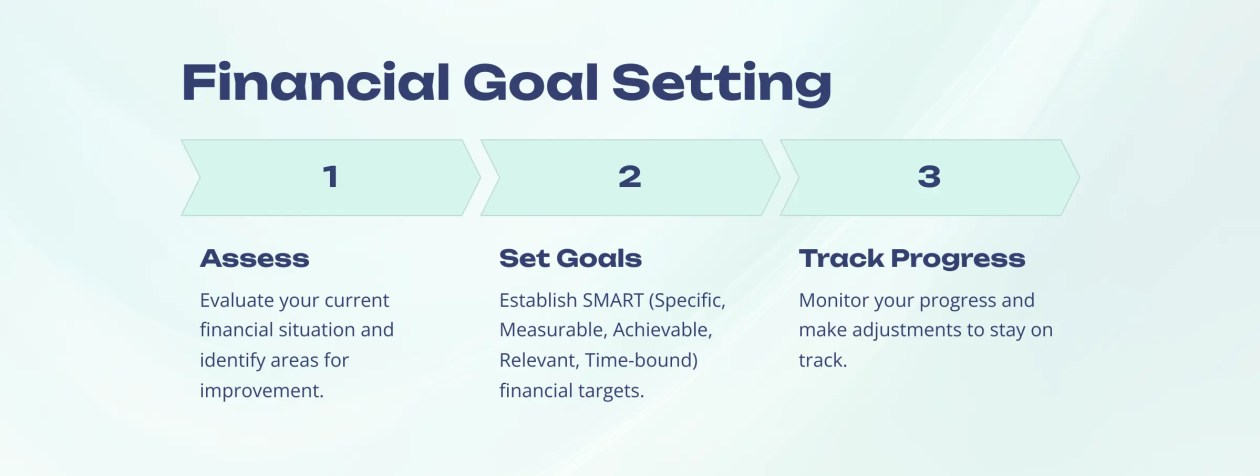Financial prosperity is often defined as an abundance of wealth and success. According to a recent survey, being considered wealthy requires having around $1.9 million. But prosperity isn’t just about money. In this ultimate guide, we will explore how to define prosperity in terms of financial goals and the crucial role strategic planning plays in achieving it. Let’s dive into achieving the financial goals and understanding prosperity better.
- Financial Goals for 2025
- Assessing Your Current Financial Situation
- Setting SMART Financial Goals
- Building an Emergency Fund
- Eliminating Debt and Managing Credit
- Saving for Retirement
- Investing for Long-Term Wealth
- Homeownership and Real Estate Investments
- Building Multiple Streams of Income
- Tax Planning and Optimisation
- Reviewing and Adjusting Your Plan
- Summary
Financial Goals for 2025
Assessing Your Current Financial Situation
To pave the way for a better future, start by checking your financial situation now. Look at how much money you get, what you’ve saved, and any investments you have. Think about where your money comes from and if it matches your short-term financial goals.
Also, make sure you’re handling debts the right way. See what you owe on things like loans, credit cards, and home payments. Sort them by which ones cost you more in interest, and make a plan to pay them off bit by bit. This will help you get rid of debts and improve how well you’re doing with the money.
Another important part is figuring out how much you spend and making a budget. This way, you can see how you use the money each month and make a plan to save more. It helps you control your money better and spot areas where you can spend less.
Setting SMART Financial Goals
Once you’ve checked out your money situation, it’s time to create clear and smart goals. You can use the SMART framework, which is short for specific, measurable, achievable, relevant, and time-bound. This way, your goals will be clear and give you a path to success.
Here are some examples of SMART financial goals for 2025:
- Save up to $10,000 to buy a home by December 2025.
- Bring down credit card debt by $5,000 in the next six months.
- Add 5% more to your retirement savings every year for five years.

Setting SMART goals helps you know exactly where you’re going and have goals you can measure. This makes it easier to see how far you’ve come and stay excited about it.
Related Article: Financial Affirmations for Wealth
Building an Emergency Fund
Economic stability is a key component of long-term financial prosperity, and having a rainy day fund is vital in achieving it. An emergency fund acts as a safety net during unexpected situations such as job loss or medical emergencies.
Determining an appropriate amount to save in your emergency fund varies from person to person, but a general guideline is to aim for three to six months’ worth of living expenses. Consider your monthly bills, essential living costs, and any potential financial obligations to establish a suitable emergency fund target.
Consistently growing your emergency fund requires discipline and strategic planning. Set aside a portion of your income each month specifically for this purpose, automating the process if possible. Explore high-yield savings accounts or other investment options that offer both growth potential and quick accessibility in case of emergencies.
Eliminating Debt and Managing Credit
Debt can be a significant obstacle on your path to financial prosperity. Creating a debt repayment plan is crucial to regain financial independence (FI). Start by listing all your debts, including outstanding balances, interest rates, and monthly payment obligations.
Begin by tackling high-interest debts first, often credit cards or loans with steep interest rates. By focusing on these debts, you can reduce the overall interest paid and make significant progress in eliminating debt.
Managing credit is another crucial aspect of financial success. Regularly review your credit reports and scores to ensure accuracy and identify areas for improvement. Paying bills on time, keeping credit utilisation low, and avoiding unnecessary credit inquiries are essential strategies to maintain a healthy credit score.

Saving for Retirement
Saving for retirement is important, no matter how old you are. Compounding helps your money grow, and starting early is really helpful. Create a retirement savings account, like a 401(k) from your work or an IRA.
You can make the most of your retirement savings by putting the most money allowed each year. If your job offers to match your savings, that’s a good deal to consider. In your retirement account, spread your money across different investments, like stocks and bonds.
Pick ones that match your comfort with risk and what you want in the long run. This way, you’ll be ready for retirement and still meet your short-term financial goals.
Investing for Long-Term Wealth
Investing is a key strategy for building long-term wealth. Familiarise yourself with basics such as stocks, bonds, and mutual funds. Understand the risks and rewards associated with each investment option.
Assess your risk tolerance, which refers to your ability to withstand market fluctuations and potential losses. Creating a well-diversified investment portfolio that aligns with your risk tolerance is crucial. Consider seeking advice from a financial advisor to ensure that your investments are optimised for your goals.
Homeownership and Real Estate Investments
Owning a home is a big step toward success for many people. When you’re thinking about buying a house, you need to think about things like where it is, if you can afford it, and if you could sell it later. Figure out how much money you have and learn about different kinds of home loans and their costs to find what works for you.
Investing in real estate can also be a way to make money and build wealth. Learn about different ways to invest, like buying houses to rent or real estate investment trusts (REITs). Think about the chances of making money and the possible risks of each investment before you decide. Make sure to consider these things when planning your financial goals for 2025.
Building Multiple Streams of Income
To achieve true financial prosperity, it is important to diversify your sources of income. Relying on a single income stream can be risky, as unexpected financial setbacks can significantly impact your stability.
Identify potential side hustles or part-time ventures that align with your skills and interests. These can range from freelance work to starting a small business. Additionally, explore strategies for passive income generation, such as rental properties or dividend-yielding investments. Multiple streams of income provide additional financial security and increase your potential for long-term wealth accumulation.
Tax Planning and Optimisation
Tax planning plays a vital role in optimising long-term financial growth. Understand the tax deductions, credits, and exemptions available to you. Work with a tax professional or utilise tax software to ensure you are maximising your tax outcomes.
Strategies such as tax-efficient investing, maximising retirement contributions, and taking advantage of tax-advantaged accounts can help minimise your tax liabilities. Regularly review your tax situation to identify any potential opportunities for optimization and ensure compliance with tax laws.

Reviewing and Adjusting Your Plan
Making a money plan isn’t something you do just once. It’s a job that needs you to look at it often and make changes when needed. Keep checking how you’re doing with your short-term financial goals and change things if something’s different.
Check how well your plans are working and find places where you can do better. Celebrate when you reach small goals, but remember, the most important thing is looking at the big picture of financial prosperity.
Summary
To sum it up, creating a path to success needs smart planning and clear steps. First, figure out your financial situation. Then, set SMART goals. Having some extra money for emergencies is important, too.
Getting rid of debt and handling credit wisely is part of your strong start. For your financial goals for 2025, think about saving for when you’re older, like retirement. You can also invest more money in the long run. Owning a home and investing in real estate can help.
Having more than one way to earn money is smart, and knowing about taxes is important too.
Want more tips? Get new post notifications emailed to you.
Welcome to Financial Freedom Journey!
If you liked this article, then please subscribe to our Youtube Channel and also you can find us on Twitter, Instagram, Pinterest, and Facebook.

Somebody essentially help to make significantly articles I’d state. This is the first time I frequented your web page and up to now? I surprised with the research you made to make this actual post incredible. Fantastic job!
Thanks for the kind words! Kindly subscribe to receive the update information